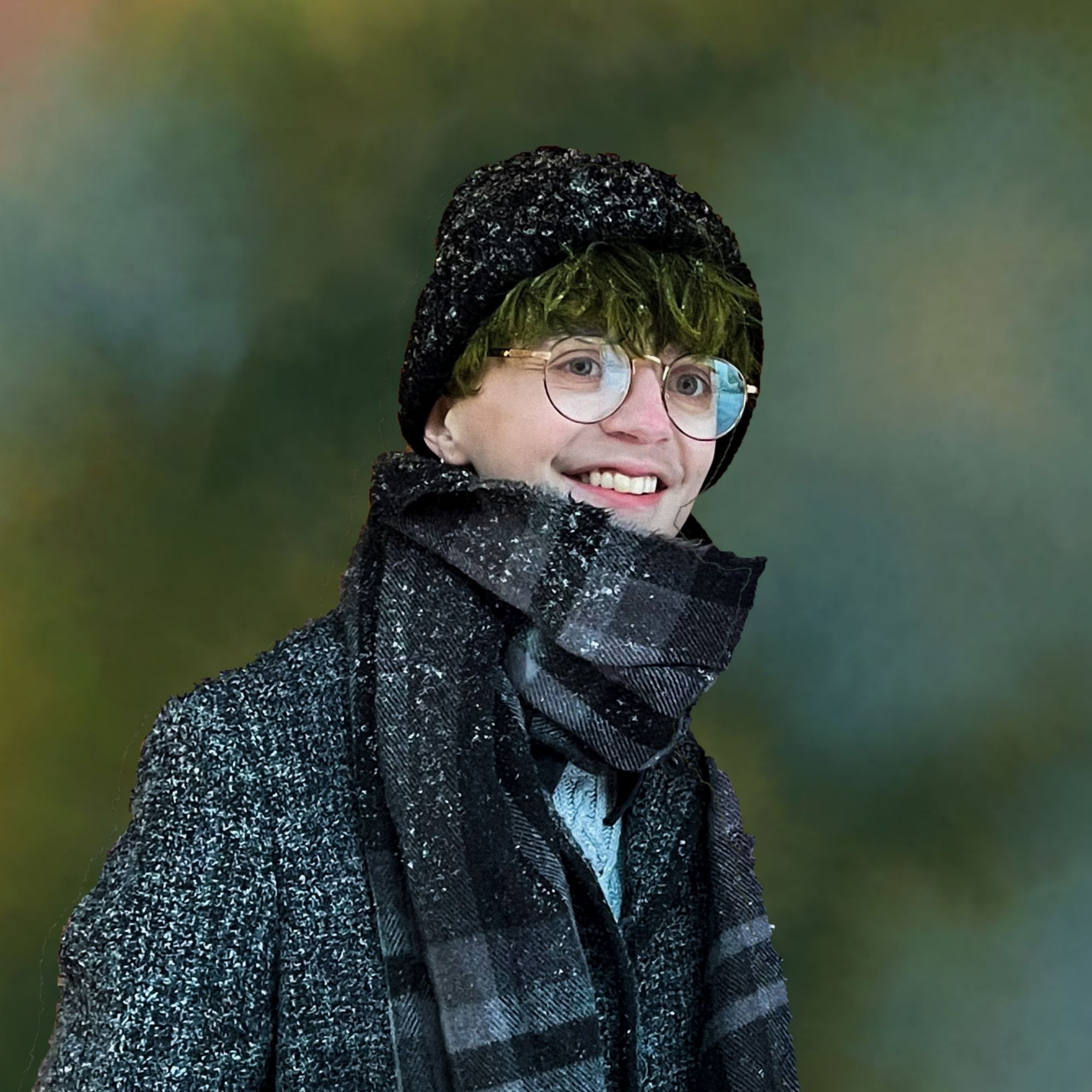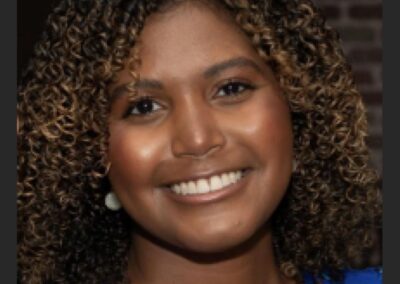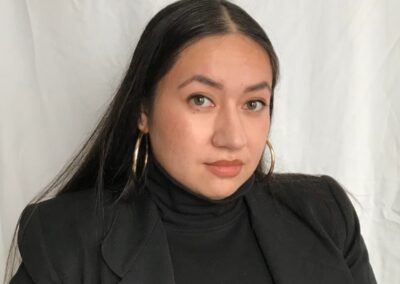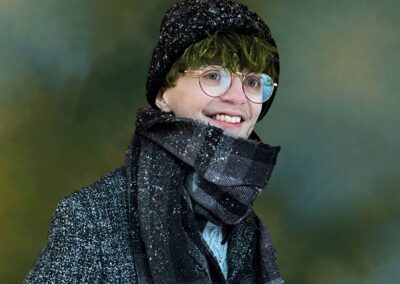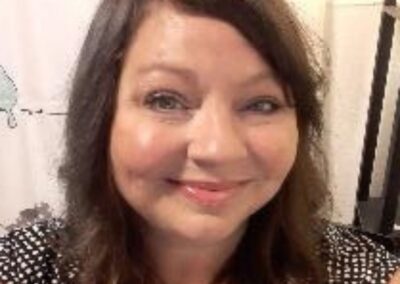They/He
As a Community Coordinator for the Climate Action Plan project, I sought to form meaningful connections with folks in the Lawrence-Douglas County community so as to help to record and share their experiences regarding our current climatological moment. As a queer, trans barista, my community hub/demographic was a bit more varied, as along with connecting with other queer people, I have had the opportunity to form connections and recurring relationships with a lot of folks with very different interests and lived experiences; I talked with mushroom foraging enthusiasts, stay at home moms, mail delivery people, indigenous environmentalists, queer motorcyclists, and more. All that to say, from behind an espresso machine I’ve been able to find a way to share warm drinks and meaningful words with lots of folks and delve deeper into folks’ recurring emotions, needs, etc. with regard to climate change. In leading these dialogues and interviews, I found that after forming an initial connection, scheduling a later time to further chat with someone, often with the company of another individual that person is close to, led to the most enlightening and electric of conversations. Along with verbal conversations, I also introduced the opportunity to create collaborative visual representations of the feelings and thoughts folks were experiencing as they reflected on their own emotions and thoughts with regard to climate change. This was something that small group interview settings tended to be more comfortable or open to, and I think it was a very valuable method of expressing the more vulnerable aspects of climate stories in a way that feels more constructive and creative as opposed to overwhelming for everyone involved.
Feelings that emerged in almost, if not every, interview conducted was one of fear, anxiety, and overwhelm regarding climate change. The topic tended to be met with a reaction of feeling overshadowed by the seemingly unfathomable largeness of the scale and impact of climate change and this was very often paired with a fear or anxiety about not knowing enough about what is happening, why it is happening, and how to go about existing in such a precarious state. For instance, in reference to thinking about how intense thinking about climate change can be, one long-time Lawrence resident said,
“It feels like doom, and when you think about all of the media and it just kind of continues to push this idea that this is the end of the world, there’s all of these fires happening, good luck. But they don’t really tell you like why did this happen, why are we at this point, how can we change moving forward? They just kind of give you the worst of the information so you as a consumer sit there, and you’re like well what am I supposed to do? So instead you just end up dreading, and being scared, and not wanting to have those conversations because you don’t want to hear that, ‘oh it’s getting worse’ or whatever.”
This feeling was reiterated countless times in my conversations. How we got to this feeling was more varied; for instance, many of the parents I talked to expressed this fear and overwhelm as a result of realizing the future impact this would have on their children and the world they will inherit. For many other folks, it was the realization of a physical discomfort, ailment, illness, etc. being made more prominent because of more drastic weather changes that started the spiral to fear and anxiety. In most every case, some aspect of who they are (whether that be a core identity or the hobby they are passionate about) has been directly impacted by climate change and incited some level of anxiety or fear surrounding our current climate emergency. Those who exist at the intersections of more marginalizations tended to be more hyper-aware/anxious about climate change and, likewise, more activated about action regarding climate change. These feelings of anxiety and fear were also almost always paired with at least an initial feeling of hopelessness or defeat. A recent KU grad and trans woman author in Lawrence, on this subject, noted that,
“To be honest I also sometimes feel kind of hopeless about our prospects of redirecting the path we seem to be on and trying to create a better future, although I try to not get overwhelmed by that feeling. I just think about how society needs to be radically overhauled and how much resistance there is to that from governments, corporations, etc.–like not to go on a tangent but the whole pandemic has been a pretty glaring example of how people in power respond to crises by just protecting their self interests… and that just makes me think about how the climate crisis will just cause more and more natural disasters and other emergencies, and how marginalized people will suffer the most.”
Indeed, most folks tended to start off talking about feeling stuck, unsure of what to do, and overwhelmed by the wave of grief that often accompanies facing a future that looks so different from what folks imagined or expected for themselves and those they care about. One single father of three said,
“I don’t know if I can really boil it down to some words. It’s, it’s..but..it’s — I think it’s essentially just a feeling of that. There’s so many prophecies that are coming true. And it’s like, the perfect, you know, disappointment, sorrow. Like and it’s strange because it’s like we’re there. We haven’t, you know, it’s like we haven’t yet lost the butterfly, the butterflies are still here, but it’s like, you can see things like that on the horizon. I feel like my personal process the past, you know, 2 or 3 years, I kind of disconnected since I kind of came to this point where I was like, really looking at the numbers and seeing, ‘okay what needs to happen’ and then I kind of had this intuition or moment of clarity where I was like ‘oh, it’s not going to happen. we’re not going to hit all these things [e.g.emissions goals].’ I was looking at the models and they have to keep adjusting them. Because then I was like, ‘okay, this is happening.’ yeah, and then I think that kind of the past few years, I’ve just sort of been like, walking around with that, like, and what does it mean to be a human knowing that, like, I’m in the age of the end of our history?”
Despite this feeling of hopelessness, which seems to have in some capacity arisen from the sort of isolation our current socio-political moment has constructed, most everyone I spoke with was excited by and interested in: 1) better, more hands-on education about the ‘how, why, and now what?’ of climate change for children and adults alike, 2) more holistically-accessible and environmentally-aware indoor and outdoor community hubs and infrastructures, and 3) deeper, more meaningful community connection and support networks.
Across the board folks talked about wishing there were more opportunities for real-life and hands-on education surrounding climate change and alternate ways of living, specifically emphasizing that there not be cost or other access barriers that make these resources feel exclusive in any way. Likewise, parents and nonparents alike spoke of wanting a similar educational revamp in the K-12 system regarding climate, environment, land rights, and the history of how we got to this current moment. Parents talked about this in regard to current children and the sorts of real-life learning they wanted to see: one mother of two said,
“I would love, love, love, love to plant a flower garden and an herb garden. I also love to cook a lot with [my eldest daughter]. And also herbs are expensive. I’m like, ‘Oh, if I just had some cilantro, or oh, I just had some dill.’ I would love to do that. And teach that to them. I remember my mom and dad were good parents, but they were just like, not very present. But my grandmother would teach me everything. Like she would just teach me how to do things and like, sit down with me, and show me and I want to pass that on to my children because like, I saw the way something is reproduced. It’s like if you actually teach them and do it with them. So I would love to learn how to plant an herb garden and upkeep it and then teach them to do it because then it’s something we can do together.”
Others reflected back on their own educational experiences and the sorts of information they did and didn’t learn and/or retain, along with the sorts of important re-education that is necessary for everyone. For instance, one recent Haskell graduate and environmental scholar here in Lawrence said:
“I think that as a indigenous person, myself – I come from the Seminole Nation of Oklahoma. I belong to the Tusekia Harjo band and Hvlpvtvlke or alligator clan. So as we walk together on this Turtle Island, we all play a part and we all have a job to do. I totally believe that everyone has a purpose. And it’s not to destroy our home or mother. So I think that all things are connected, I think when colonization and assimilation came into a role for indigenous community we didn’t really get the choice to us as individuals or people. So that really hinders our specific ways of life, and how we can actually incorporate ourselves into our environment. So I think that the challenging part of this is that a lot of our life ways have been stripped. …. And I think that ties into how we incorporate our environment. So I think what I’m really trying to say is that this place, this Turtle Island, this Mother Earth, this home is incorporated with all living things, and all those pieces have spirit, all those things have life and deserve to be recognized for who they are, and their role in this world. So when we are diminishing those or silencing those voices, that really doesn’t help anyone out in the end. I think being mindful of where you are, I think plays a really tremendous role in implementing change or action. Knowing your place and a sense of place, I mean, look at here in Kansas…if you were to go up to somebody and say, ‘hey who’s federally recognized within Kansas, or the tribes that live here now,’ you know, half those people probably wouldn’t even know, right? Probably way more than half. And I think, knowing who lies here, and who walked this space, and this land before is very important in enabling change, and positive action. So I think that’s the first point, having the respect to know what your surroundings are. And being mindful of those people that were and are here.”
In all there is a case to be made for the development of educational resources and opportunities that uplift the indigenous people who live here, as well as redistributing wealth and land back to indigenous communities for the betterment of the relationship to the land. Likewise, education on the native ecology of our location and how to exist, grow, and develop new modes of being with our environment instead of acting upon it. In line with this, folks also expressed interest in an increased investment in spaces that foster this sort of ‘play, learn, experience’ mode of learning about and addressing larger climate change impacts. Folks talked about ensuring spaces were free, accessible, and comfortable even in more strenuous weather situations (e.g. shade, cooling, water for extreme heat), interactive pollinator and native flora gardens, community gardens, and other modes of growing and community development. This leans into the final theme that came up in many of the conversations I had about climate change – a need for deeper community and support structures for all aspects of people’s wellbeing with specific care to the new sorts of experiences of this precarious climate moment. Folks feel isolated, hopeless, and fearful because they aren’t given the time or space to invest in community connection, care and relation. Developing support groups (with access to financial resources as well) to deal with climate grief, to support physical and emotional needs, as well as educate on climate change, etc. seem to be an impactful part of an approach to facing and working in accordance with the stressors being put on the world at large (especially those most marginalized folks) as a result of climate change as it continues to emerge and progress.

